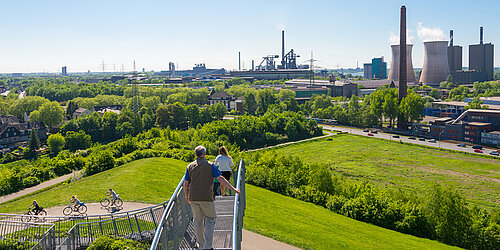If environmental protection and climate action are to succeed, resources must be handled sustainably. This presents challenges for former coal regions. ZUG develops action plans and supports regions undergoing structural change.
The unchecked exploitation of natural resources not only damages the environment but also causes long-term harm to humanity. The principle of sustainability emphasises the social and environmental compatibility of economic activities while attempting to discover new paths for consumption and resource usage. With its German Sustainable Development Strategy (DNS), the Federal Government has set itself 17 targets that are to be achieved by 2030. Climate change mitigation, sustainable consumption and other social, ecological and health aspects are to form the basis of political action.
On the path to the sustainable handling of natural resources and a strong focus on climate change mitigation, a fossil fuel phase-out is unavoidable. To ensure the corresponding structural change is as socially compatible as possible, ambitious climate targets go hand-in-hand with a duty to ensure the structural strengthening of former coal regions.
Supporting structural change
Supporting third-party projects is a key instrument that governments use to accelerate structural change and implement sustainable development goals: ZUG creates the link between sponsors on the one hand and local communities and actors on the other. ZUG also encourages project development, suggests courses of action, networks actors, provides information about funding options, reviews proposals and ensures funds are properly used.
Current programmes and initiatives
By supporting model community projects for implementing ecological sustainable development goals in regions of structural change, the Federal Ministry for the Environment, Nature Conservation, Nuclear Safety and Consumer Protection (BMUV) is helping communities and other actors in selected lignite regions make a start on a long-term, environmentally compatible development strategy in line with the DNS.
With its 2030 Agenda for Sustainable Development, the United Nations has agreed on 17 global sustainable development goals. One of these goals is to ensure sustainable patterns of consumption and production. The National Network of Sustainable Consumption is promoting cooperation between research, politics, business and civil society in this field. On behalf of the Federal Environment Agency (UBA), ZUG is developing action plans and topics for this network and has been commissioned to provide support services.
The Competence Centre on Climate Change Mitigation in Energy-Intensive Industries (KEI) provides support and funding for the mitigation of greenhouse gas emissions to energy-intensive industries in Germany. With its head office in Cottbus, in the former lignite-producing region of Lusatia, ZUG is also creating jobs and new perspectives for the region.

